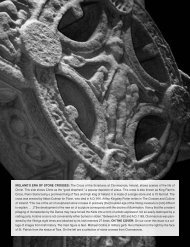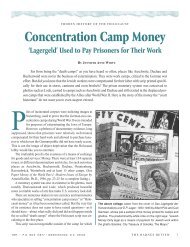You also want an ePaper? Increase the reach of your titles
YUMPU automatically turns print PDFs into web optimized ePapers that Google loves.
PAGE 14 the barnes review MAY/JUNE<br />
them as alien interlopers enamored with,<br />
but still beneath, the dignity of Rome.<br />
Similarly, theology was affected, or,<br />
alternatively, many of the political is -<br />
sues were at root theological ones. <strong>The</strong>o -<br />
logical disputation was central for both the<br />
East and the West, and, according to Nor -<br />
wich, was a specifically Byzantine passion.<br />
When the empire was separated into two<br />
parts, the two segments developed differently<br />
from each other. <strong>The</strong> case was also<br />
true with regard to theology. But there<br />
came a time where the chasm was too<br />
broad to be easily bridged. Questions over<br />
papal supremacy (rather than primacy,<br />
which is rather uncontroversial), the filioque<br />
(seemingly rather academic, but contains<br />
many implications concerning the<br />
nature of the trinity), and many other<br />
issues made it extremely difficult to<br />
express unity. <strong>The</strong> fraud that was “the<br />
Council of Florence” was forced upon the<br />
Byzantines just a few years before their<br />
fall. That council simply imposed “Roman”<br />
(Western) theology upon Byzantium, which<br />
had no choice but to comply, for the<br />
“Romans” (of the First Rome) had promised<br />
military assistance if they would give in to<br />
demands that “Rome” would not have<br />
thought of making just a century before.<br />
Given that the “Second Rome” was about to<br />
fall, this was a measure of desperation and<br />
done completely under duress.<br />
This, of course, came about 200 years<br />
after the ill-fated crusades. <strong>The</strong>se military<br />
ventures, while having a noble purpose,<br />
were not led by noble minds. <strong>The</strong> crusades<br />
failed for numerous reasons, largely having<br />
to do with the fact that they were organized<br />
along lines later immortalized by the Three<br />
Stooges. Furthermore, with the occasional<br />
complicity of the pope of Rome, they were<br />
directed as much against the Orthodox as<br />
against the Muslims. Interestingly, both<br />
sides used the Muslim “enemy” against<br />
each other when it suited their interests.<br />
This culminated in the “Fourth Crusade,”<br />
which was explicitly aimed at Constantin -<br />
ople and not Islam. A weakened eastern<br />
empire was overwhelmed by the tribes of<br />
the West, including the Normans, many of<br />
whom had little firsthand knowledge of<br />
Chris tianity or civilized government. When<br />
these bumpkins came to the gates of the<br />
most elaborate and ostentatious city in<br />
Eur o pean history, their lusts led to the<br />
slaughter of thousands of eastern Romans:<br />
This Byzantine “miracle of the loaves and fishes” is a mosaic from the nave<br />
wall of Sant’ Apollinare Nuovo in Ravenna and dates from about A.D. 504.<br />
clergy, women and other non-combatants as<br />
well as soldiers. <strong>The</strong> Latins then occupied<br />
the empire, such as it then was, and ruled it<br />
as their personal satrapy (with the full consent<br />
of the Roman pope), holding the<br />
Romans (i.e., Byzantines) in utter contempt.<br />
<strong>The</strong> crusaders were able to carve out<br />
a few small and basically insignificant ministates<br />
in the Levant (a part of Europe<br />
under the Romans, but now Islamicized)<br />
after deposing the canonical Byzantine<br />
prelates. Now, Pope Innocent clearly did not<br />
sanction the slaughter, in fact, he deplored<br />
it. On the other hand, he never anathematized<br />
the usurpers of the By zan tine state or<br />
punished them in any respect. In fact, after<br />
the Latins took the city, the pope recognized,<br />
after nearly 900 years, Byzan tium’s<br />
status as the “Second and New Rome,”<br />
which was solemnly proclaimed at the first<br />
ecumenical council but re sisted by the pope<br />
of Rome at that time. At this time, that<br />
august title was proper now that the city<br />
was in the hands of the La tins. <strong>The</strong>re can be<br />
no question that this situation remains an<br />
important part of the re ligious estrangement<br />
between East and West.<br />
This “Rape of Constantinople,” importantly,<br />
made it impossible for the churches<br />
to ever become unified again; only recently<br />
have moves in this direction occurred. It<br />
was largely because of this seminal crime<br />
that the Orthodox Church, in no small<br />
part, still opposes union with Rome, starting<br />
from the grass-roots rebellion that<br />
deposed the prelates present at the “Coun -<br />
cil of Florence,” imposing “unity” by force.<br />
As if, in Norwich’s prescient words, “unity<br />
could ever be achieved by a stroke of a pen.”<br />
Of course, after this, Byzantium was never<br />
the same. With some propriety can one<br />
claim that Byzantium fell in 1204, at least<br />
in that she was never able to regain her collective<br />
esteem, military power and sense of<br />
mission ever again. <strong>The</strong> Holy City had been<br />
violated, and violated in the most vile way<br />
by groups of marauders, under orders from<br />
the First Rome, to stamp out “heresy.” <strong>The</strong><br />
sore festers to this day between East and<br />
West. After this, the “empire of Byzantium”<br />
was eventually split into four units, the<br />
most important of which was the<br />
“despotate of Epiurus,” along with the<br />
sebastocrators of <strong>The</strong>ssaly and the despots<br />
of <strong>The</strong>ssalonica, which lasted but a short<br />
time. <strong>The</strong>n, the Islam icists found a<br />
Byzantium hopelessly divided and an<br />
empire with no morale to speak of. <strong>The</strong><br />
emperor himself died in hand-to-hand combat<br />
with the hordes of Muslims on that<br />
fateful day in July of 1453.<br />
Through much of Byzantium’s history,<br />
she was the “man to beat.” Her incredible
















